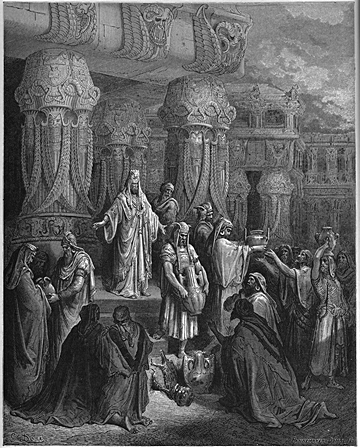Ezra 1
1 In the firste yeer of Cirus, kyng of Persis, that the word of the Lord bi the mouth of Jeremye schulde be fillid, the Lord reiside the spirit of Cyrus, kyng of Persis; and he pupplischide a vois in al his rewme, ye, bi the scripture, and seide, Cirus,
Pea ko eni, ʻi he ʻuluaki taʻu ʻo Kolesi ko e tuʻi ʻo Peasia, pea koeʻuhi ke fakamoʻoni ai ʻae folofola ʻa Sihova ʻi he ngutu ʻo Selemaia, naʻe ueʻi ʻe Sihova ʻae laumālie ʻo Kolesi ko e tuʻi ʻo Peasia, pea naʻe fanongonongo ʻe ia ʻae fono ʻi hono puleʻanga kotoa pē, pea naʻe tohi ia foki, ʻo pehē,
2 the kyng of Persis, seith these thingis, The Lord God of heuene yaf to me alle the rewmes of erthe, and he comaundide to me, that Y schulde bilde to hym an hows in Jerusalem, which is in Judee.
ʻOku pehē ʻe Kolesi ko e tuʻi ʻo Peasia, “Kuo tuku kiate au ʻe Sihova ko e ʻOtua ʻoe langi ʻae ngaahi puleʻanga kotoa pē ʻo māmani: pea kuo fekau ʻe ia kiate au ke u langa ʻae fale moʻona ʻi Selūsalema, ʻaia ʻoku ʻi Siuta.
3 Who is among you of al his puple? his God be with hym; stie he in to Jerusalem, which is in Judee, and bilde he the hows of the Lord God of Israel; he is God, which is in Jerusalem.
Ko hai ia ʻiate kimoutolu ʻi hono kakai kotoa pē? Ke ʻiate ia ʻa hono ʻOtua, pea ke ʻalu hake ia ki Selūsalema, ʻaia ʻoku ʻi Siuta, pea ke langa ʻae fale kia Sihova ko e ʻOtua ʻo ʻIsileli, (ko ia ia ko e ʻOtua, ) ʻaia ʻoku ʻi Selūsalema.
4 And alle othere men, `that dwellen where euere in alle places, helpe hym; the men of her place helpe in siluer, and gold, and catel, and scheep, outakun that that thei offren wilfulli to the temple of God, which is in Jerusalem.
Pea mo ia fulipē ʻoku toe ʻi ha potu ʻaia ʻoku ʻāunofo ia ki ai, tuku ke tokoni ia ʻe he kau tangata ʻo hono potu ʻaki ʻae siliva, pea mo e koula, pea mo e ngaahi koloa pea mo e fanga manu, ko hono fakalahi ia ʻoe ngaahi meʻa ʻoku foaki loto lelei ki he fale ʻoe ʻOtua ʻoku ʻi Selūsalema.”
5 And the princis of fadris of Juda and of Beniamyn risiden, and the preestis, and dekenes, and ech man whos spirit God reiside, for to stie to bilde the temple of the Lord, that was in Jerusalem.
Pea naʻe toki tuʻu hake ai ʻae kau tuʻukimuʻa ʻi he mātuʻa ʻo Siuta mo Penisimani, mo e kau taulaʻeiki, pea mo e kau Livai, pea mo kinautolu kotoa pē naʻe fakaakeake honau laumālie ʻe he ʻOtua, ke ʻalu hake ke langa ʻae fale ʻo Sihova ʻaia ʻoku ʻi Selūsalema.
6 And alle men that weren `in cumpas helpiden the hondis of hem, in vesselis of siluer, and of gold, `in catel, in purtenaunce of houshold, and in alle werk beestis, outakun these thingis which thei offriden bi fre wille.
Pea naʻe fakamālohi honau nima ʻekinautolu kotoa pē naʻe nonofo fakataha mo kinautolu, ʻaki ʻae ngaahi ipu siliva, mo e koula, mo e ngaahi koloa, mo e fanga manu, pea mo e ngaahi meʻa maʻongoʻonga, ka ʻoku lau kehe ʻae ngaahi meʻa kotoa pē naʻe ʻatu loto ʻofa pe.
7 Forsothe kyng Cyrus brouyte forth the vessels of the temple of the Lord, whiche Nabugodonosor hadde take fro Jerusalem, and hadde set tho in the temple of his god.
Pea naʻe fetuku mai foki ʻe Kolesi ko e tuʻi ʻae ngaahi ipu ʻoe fale ʻo Sihova, ʻaia naʻe fetuku ʻe Nepukanesa mei Selūsalema, pea naʻa ne tuku ia ʻi he fale ʻo hono ngaahi ʻotua;
8 Sotheli Cyrus, the kyng of Persis, brouyte forth tho bi the hond of Mytridatis, sone of Gazabar; and noumbride tho to Sasabazar, the prince of Juda.
ʻIo, naʻe ʻomi ia [kotoa pē ]ʻe Kolesi ko e tuʻi ʻo Peasia ʻi he nima ʻo Mitilitati ko e tauhi koloa, pea lau ia kia Sesipasa, ko e ʻeiki ʻo Siuta.
9 And this is the noumbre of tho vessels; goldun violis, thritti; siluerne viols, a thousynde; `grete knyues, nyne and twenti; goldun cuppis, thritti; siluerne cuppis,
Pea ko hono lau eni: ko e ipu lafalafa koula ʻe tolungofulu, mo e ipu lafalafa siliva ʻe taha afe, mo e hele ʻe uofulu ma hiva,
10 two thousynde foure hundrid and ten; othere vessels, a thousynde;
Ko e ipu luoluo koula ʻe tolungofulu, mo e ipu luoluo siliva ʻoe anga ʻe taha ko e fāngeau mo e hongofulu, pea ko e ngaahi ipu kehe ʻe taha afe.
11 alle the vessels of gold and siluere weren fyue thousynde foure hundrid. Sasabazar took alle vessels, with hem that stieden fro the transmygracioun of Babiloyne, in to Jerusalem.
Ko e ngaahi ipu koula mo e siliva kotoa pē ko e nima afe mo e nimangeau. Naʻe fetuku eni kotoa pē ʻe Sesipasa fakataha mo kinautolu ʻoe kau pōpula ʻaia naʻe ʻohake mei Papilone ki Selūsalema.





















